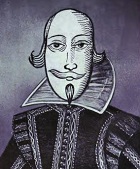| directory |
| home | contact |
|
|||||||||||||||
| search | |||||||||||||||
Shakespeare Glossary: WIf you need more information on a particular word or the context in which it is used, please see the play or sonnet in which the word appears for detailed annotations at the bottom of each page.Also please see Shakespeare's Characters: A to Z. Here you will find a comprehensive list of every Shakespearean character and the play in which he or she appears. Included is our exclusive spelled pronunciation guide, essential for actors and teachers, and an in-depth biography of many of Shakespeare's most popular and fascinating creations. WAFT: to wave, beckon; to turn away. WAFTAGE: passage by water. WAFTURE: wave. WAGE: to renumerate; to lay as a wager; to venture, hazard. WAGGISH: roguish. WAGGON: chariot, carriage. WAGGONER: charioteer. WAGTAIL: an obsequious person. WAINROPE: cart-rope. WAILFUL: lamentable. WAIST: girdle; the middle of a ship. WAIT: to be expecting something; to be in attendance. WALK: a person's way or course; a tract of garden or park; to withdraw. WALL-EYED: glaring, fierce-looking. WALL-NEWT: small lizard. WAN: to turn pale. WAN'D: withered. WANNION: with a vengeance. WAPPENED: withered, stale. WARD: to guard. WARDEN: a large pear used for baking. WARDER: staff held by one presiding over a combat. WARM: well off, comfortable. WARN: to summon. WASP-STUNG: irritable. WASSAIL: revelry. WAT: a common word for a hare. WATCH (1): clock. WATCH (2): being constantly awake. WATCH (3): to be or lie awake; to look out for. WATER: consumable liquid; tears; the lustre of a diamond. WATER-FLY: fly that hovers over water; idle person. WATER-GALL: a secondary rainbow. WATER-RUG: a kind of dog. WATER-WORK: painting in distemper. WAX: to grow. WAXEN: perhaps, to hiccough. WEALTH: weal, advantage. WEAR: fashion. WEATHER-FEND: to defend from the weather. WEB AND PIN: the cataract in the eye. WEE: small, tiny. WEE: to think. WEED: garment. WEET: to wit, know. WEIGH OUT: to outweigh. WELKIN: the sky. WELKIN: sky-blue. WELL-LIKING: in good condition. WELL SAID: int. well done! . WEND: to go. WESAND: the wind-pipe. WHELK: a weal. WHELKED: marked with whelks or protuberances. WHEN: an exclamation of impatience. WHEN AS: when. WHERE: whereas. WHERE: a place. WHIFFLER: an officer who clears the way in processions. WHILE-ERE: a little while ago. WHILES: until. WHIP-STOCK: handle of a whip. WHIST: hushed, silent. WHITE: the centre of an archery butt. WHITELY: pale-faced. A doubtful word. WHITING-TIME: bleaching time. WHITSTER: bleacher. WHITTLE: a clasp knife. WHOO-BUB: hubbub. WHOOP: to cry out with astonishment. WICKED: noisome, baneful. WIDOW: to settle a jointure upon; to become a widow. WIDOWHOOD: the estate belonging to a widow. WIGHT: man, person. WILD: weald. WILDERNESS: wildness. WIMPLED: veiled, blindfolded. WINDOW-BARS: lattice-work across a woman's bodice. WINDRING: winding. WINTER-GROUND: to protect (a plant) from frost. WIS: 'I'. WISH: to commend. WISTLY: wistfully. WIT: knowledge, wisdom; sound judgement. WITHOUT: beyond. WITS: five, the five senses. WITTOL: a contented cuckold. WITTY: intelligent. WOMAN-TIRED: hen-pecked. WONDERED: marvellously gifted. WOOD: mad. WOODCOCK: a simpleton, fool. WOODMAN: a hunter. WOOLWARD: shirtless. WORD: to flatter or put off with words. WORLD: life, condition of existence; 'to go to the world' is to get married. WORM: a serpent. WORSER: worse. WORSHIP: to honour. WORTH: wealth, fortune. WORTS: cabbages. WOT: to know. WOUND: entwined. WREAK: vengeance. WREAK: to avenge. WREAKFUL: revengeful, avenging. WREST: an instrument used for tuning a harp. WRIT: gospel, truth. WRITHLED: shrivelled. WROTH: calamity, misfortune. WRUNG: twisted, strained. WRY: to swerve. WRY-NECK'D: head awkwardly turned sideways. |
|
©1999-2021 Shakespeare Online. All Rights Reserved.
 Ale (beer made with a top fermenting yeast) was the drink of choice in Shakespeare's day. Everyone from the poorest farmer to the Queen herself drank the brew made from malt, and a mini brewery was an essential part of every household. Shakespeare's
Ale (beer made with a top fermenting yeast) was the drink of choice in Shakespeare's day. Everyone from the poorest farmer to the Queen herself drank the brew made from malt, and a mini brewery was an essential part of every household. Shakespeare's